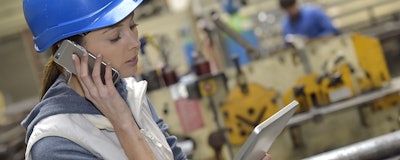
 Chris Ealahan
Chris EalahanThe robots are taking over!
Not so fast.
In the real world of manufacturing, there is no man vs. machine terminator war when it comes to getting jobs done. Rather, there are functions that both sides do better than the other. A lot of these activities have to be done using on-the-spot deductive reasoning that, people, for the most part, are endowed with.
The most successful manufacturing operations must have capable employees, but they must also be empowered to do their jobs. Just sending them out on the plant floor with a clipboard is not the way to do it. These technicians need ways to gather information and intervene when necessary that are as advanced as the systems they are interfacing. Mobile computing devices play a big role in enabling plant workers to stay on top of the operation as they traverse the vast expanse of the plant floor.
People As Part of the System
Just about all plants, regardless of size, are being managed with the help of Enterprise Resource Planning Software (ERP), such as Warehouse Management Systems. Enabling control and getting operational information to the ERP happens by the Industrial Internet of Things (IIoT), an array of connected electronics, site software, sensors, actuators, and connectors that make up its nerve system.
The challenge has been getting sufficient visibility into the job at hand for the most efficient results. Advancements in cloud technology, independent of location, are providing real-time, contextual data directly to technicians’ devices.
As a result, IIoT connected processes enable information-sharing and increase collaboration, along with helping technicians understand cause and effect. The job experience changes from simply receiving and completing tasks, to demonstrating increased levels of responsibility and increased comprehension of the system as a whole.
Mobile Computing: the Tool for Accessing the ERP System
Not too long ago, workers were discouraged from bringing cell phones and tablets into the work place, over a concern about distractions. A growing number of employees are being wired. Management is beginning to relent on the device ban and is slowly coming to realize the benefits of having access to communication and information instantly.
How slowly? According to a study released this year by the ERP provider IFS, just 31 percent of the survey respondents access enterprise software through a mobile device. According to a spokesperson for IFS, those companies not using mobile computing are holding themselves back from maximizing effectiveness on the plant floor.
Functions Maximized by Mobile Computing
Those companies that are leveraging real-time connectivity, native apps, and easy in-the-field data entry are realizing a game-changing impact on areas throughout the plant, all of which require the data-collector to roam the plant floor for functions such as these:
Employee Safety Human error can lead to injury-causing accidents, but mistakes also can lead to faulty data as employees transpose the information into spreadsheets or paper binders. Mobile devices can collect data on the fly throughout the plant, providing a swelling knowledge base that will enable the facility to avoid incidents, and do a better job of investigating them should they happen.
Equipment Maintenance Given that equipment is located all over the plant and some of it is mobile as well, portable-computing devices can feed data into the CMMS to expose conditions not normally evaluated.
Material Handling Attaching a mobile computing tablet to a forklift enables the driver to receive commands for retrieving product from warehouse shelves and the loading dock. As the forklift cruises through the facility, the tablet accumulates data to design more efficient routes to move product and minimize forklift use.
Assembly As products move along the assembly belt, they pass sensors collecting data, which can be viewed on the computer. Any reprogramming to the PLC controlling belt speed or to the firmware can be done using the computer on-site.
HVAC The mobile computer can have a built-in Bluetooth module, allowing the technician to check the health of the system and if necessary, reprogram it.

But Not Just Any Computing Tablet Does the Job
No matter how modern the factory is; no one denies that it is still a rough environment for equipment, especially electronics. But making a trip to a big-box store to select a tablet is not going to give you what you need. Here is what a mobile computing tablet has to offer to be effective in the manufacturing environment.
Ability to Handle Any Industrial Environment Even though the data fed into the enterprise system will be stored safely in “The Cloud,” it is being accumulated on the factory floor. Because these units are carried around the plant, expect them to be dropped from time to time.
The best way to evaluate a tablet’s ruggedness is to run it through a series of tests to determine just how much of a beating it can take. The most common tests will expose a tablet to vibrations, shocks, and yes, drops, to determine what level of motion or impact it can handle without breaking. Look for MIL-STD-810 shock and drop resistance which can withstand typical 3ft drops.
Component Level Rugged Design Many industrial rugged tablets utilize on-board SSDs (solid-state drives), this helps to reduce component footprint resulting in a thinner & lighter mobile computer. Solid state technology brings additional stability to the hard drive, especially when jostled. Electrical and mechanical components are designed to withstand industrial working conditions.
Designed to Run with a Variety of Operating Systems Successful management involves getting the most useful life possible from your devices, and they need the ability to handle a range of operating systems. These systems are designed to work with an embedded roadmap which has a longer life then consumer OS platforms, and include Windows Embedded (IoT), Windows Professional, Linux, along with optional Android platforms.
Touchscreen Design The two must-have features for a tablet on the factory floor in an IIoT environment are readability and responsiveness. Information must be viewed from the screen quickly and any miscomprehension can lead to serious consequences. Rugged tablet PCs have various settings, automatic light sensors (ALS), and screen film options that account for low-light, sunlight, glare, and wide viewing angles.
The demands of industrial application require screens with a useful life of 100 million touches. Many industrial operations, particularly maintenance, electrical wiring, or wash downs, require protected hands. High-tech screens on rugged tablets are responsive to touch, even when the user is wearing gloves. Resistive or projective capacitive screens are most common for rugged environments. The durability of the touchscreen can be enhanced with shatterproof glass and with an extra level or scratch resistance.
Protection Against Environmental Hazards Tablets will be used in dirty, dusty working conditions and in areas with temperature extremes.
The constant danger to the internal components of any computing device is the ingress of dust, dirt, or water through the outer unit housing. Seal is important so no water can enter the unit. Most industrial grade tablets are rated IP65, which keeps all dust and water out of the internal circuitry. Some tablets have special wide temperature range options so processors are kept at the right operating temperature regardless of the outdoor conditions.
Mounting Options and Accessories
There is a slew of options such as vehicle mounts, carry straps, and multi-bay docking stations which cannot be found with consumer grade tablets. Even if you do not find exactly what you need, a current rugged tablet PC design can likely be modified by a reputable computer hardware company.
Get Out There and Compute
If someone has a desk in a manufacturing plant, they rarely can be found at it. Operational life happens on the plant floor, and with mobile computing devices built for the factory, the technician can be ready to collect data or make any changes to processes instantaneously. Given the versatility of these devices, your computing tablet consultant can advise on which configuration best matches your needs.
Chris Ealahan is a Sales Manager at Teguar Corporation.






















